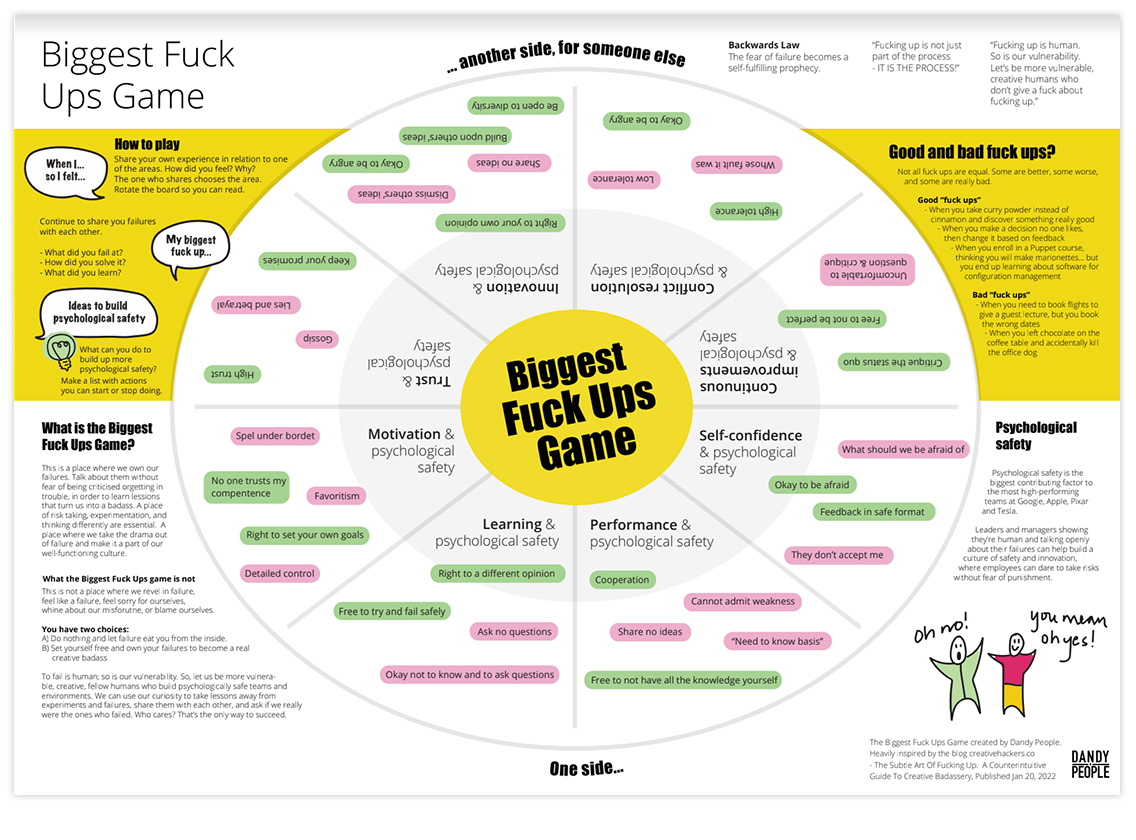The following was translated and adapted from the original post in Swedish by Jenny Persson.
We work together at Dandy to create and adapt trainings for our customers’ needs. We often sit together to generate ideas. These sessions, like the one we just had, are unbelievably fun. This time, we had read an article that inspired us to create this game. Namely: https://www.creativehackers.co/posts/the-subtle-art-of-fucking-up
Hence the game was called “Biggest Fuck Ups Game” 🙂

Download the gameboard and play Biggest Fuck Ups Game yourself >
The article triggered us, because we all knew how it feels when we’ve fucked something up. We’ve all done it! We wanted to make a serious topic like psychological safety a little more fun too. Depending on the environment we’re in when we fail, we can feel many different things. If we’re in a psychologically safe environment, we can learn from it. If we find ourselves in an unsafe environment, we get the urge to hide, minimise, or find someone to blame, all preventing us from learning from the experience. Our environment is therefore crucial. This is where Backwards Law comes in; the fear of failure becomes a self-fulfilling prophecy.
This is a sensitive and vital topic for many organisations. The foundation for whether people perform well at work, or not, lies is in psychological safety, and it’s missing in many organisations. Many BELIEVE that they have psychological safety, but when you start measuring it, it turns out it’s not that high. If there is any factor that is not ok to sit at a mediocre level, it’s psychological safety. Organisations face severe consequences in the absence of motivation, learning, self-confidence, innovation, safe conflict resolution, and the number of improvements made.
What is psychological safety?
Psychological safety is when you can talk about mistakes you’ve made without feeling judged. You are safe to share without risk of someone glaring at you. If you feel insecure in your environment, and do not have psychological safety, you will likely hold back your ideas, not ask questions, hide your weaknesses, cover up mistakes, and do as little as possible, as it is more important to do as little as possible so you can’t do anything wrong, than to act and risk failing. Psychological safety is not about having a cozy and good time where everyone has consensus. On the contrary, it is about raising your voice and having discussions where you see another view, even if it is uncomfortable and difficult. Just imagine the difference between coming to a job where people trust you know your job, compared to people requiring you to prove your knowledge constantly, all the time. How easy is it to feel psychologically safe, then?
Fucking up isn’t just part of the process, it is the process
Our new game, “Biggest fuck ups game”, is about about taking ownership of our failures, talking about them without fear of being judged, and being able to learn with others from their failures. A place where risk-taking, experimentation, and dissent are fundamental. It is a place where we destigmatise failures and accept that it is the only path toward high-performing teams.
Fucking up is not only part of the process – it is the process! To fuck up is human, just like our vulnerability. So let us be vulnerable, creative humans, who don’t care if we fuck up now and then! We can dare to be innovative, for example. Innovation is in major shortage in many organisations, and we can start to solve that shortage by having psychologically safe workplaces.
What does the research say?
In this game we started from different research areas where an effect has been shown, and linked a number of questions with each area. Some options provide psychological safety, and some options do not. We tell stories of different situations in connection to the area. In the next step, you share one of your fuck ups in any area. We end the game by raising ideas to create more psychological safety in our workplace.
Naturally. you’ll find different types of fuck ups have different consequences, but the important thing when you make mistakes is that you learn from them. How good would it be to not learn from them, after all we know now?
Some fuck ups we have done
One took curry powder instead of cinnamon and discover something really good. Or, another enrolled in a Puppet course, thinking of marionettes… but ended up learning about software for configuration management. One happened to say something that triggered a dialogue with a senior manager and forced them to find a way to resolve the conflict (pure happiness). Another booked flights on the wrong dates for a lecture they were meant to deliver (not so fun).
If we take the drama out of it, we can learn! “Who do we hang?” creates fear. We want everyone to learn so we don’t continue making the same mistake. How can we share our mistakes within our organisations? Do you have a fail wall? We share mistakes at Dandy, and you can imagine how much learning we gain from that!
References
Psychological safety contributes to motivation
Kahn, W.A. (1990) Psychological conditions of personal engagement and disengagement at work. Academy of ManagementJournal 33.4, 692-724.
May, D.R., Gilson, G.L., & Harter, L.M. (2004) The psychological conditions of meaningfulness, safety and availability and the engagement of the human spirit at work. Journal of occupational and organizational psychology 77.1, 11-37.
Psychological safety enables greater learning in teams
Edmondson, A.C. (1996) Learning from mistakes is easier said than done: Group and organizational influences on the detection and correction of human error. The journal of applied behavioral science 32.1, 5-28.
Tucker, A.L., Nembhard, I.M., & Edmondson, A.C. (2007) Implementing new practices: An empirical study of organizational learning in hospital intensive care units. Management Science 53.6, 894-907.
Psychological safety predicts team performance
Edmondson, A.C. (1996) Learning from mistakes is easier said than done: Group and organizational influences on the detection and correction of human error. The journal of applied behavioral science 32.1, 5-28.
Psychological safety, together with high standards, leads to learning
Edmondson, A.C. (2008). The competitive imperative of learning, HBS Centennial Issue. Harvard Business Review 86.7/8, 60-67.
Psychological safety increases employees’ self-confidence in their knowledge
Siemsen, E., Roth, A.V., Balasubramanian, S., & Annand, G. (2009) The influence of psychological safety and confidence in knowledge on employee knowledge sharing. Manufacturing & service operations management 11.3, 429-447.
Psychological safety leads to more continuous improvements and higher quality
Hallbesleben, J.R.B. & Rathert, C. (2008) The role of continuous quality improvement and psychological safety in predicting work- araounds. Health care management review 33.2, 134-144
Psychological safety enhances innovation’s effect on company results
Baer, M. & Frese, M. (2003) Innovation is not enough: Climates for initiative and psychological safety process innovations, and firm performance. Journal of organizational behavior 24.1, 45-68.
High psychological safety leads to resolving conflicts in more constructive ways
Bradley, B. H., Postlethwaite, B.E., Hamdani, M.R., & Brown, K.G. (2012) Reaping the benefits of task conflict in teams. The critical role of team psychological safety climate. Journal of applied psychology 97.1, 151-158.


